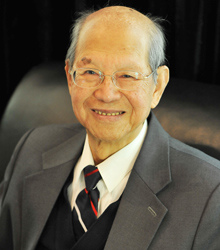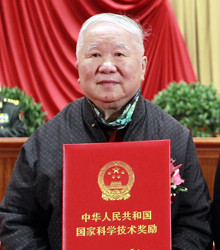| Top Scientists Awarded
 |
 |
|
Xie Jialin (LIU JIE) |
Wu Liangyong (JU PENG) |
Two Chinese scientists, physicist Xie Jialin and architect Wu Liangyong, received the State Top Scientific and Technological Award, China's top science award, on February 14, 2012, for their outstanding contributions to scientific and technological innovation. The two scientists, both members of the Chinese Academy of Sciences (CAS), each received 5 million yuan ($794,900) for the prize. China has given this award annually to elite scientists and researchers since 2000.
Xie, 92, is one of the founders and pioneers of China's accelerator physics. He once studied at the California Institute of Technology in the United States, and then obtained a PhD from Stanford University. He returned to China in 1955. In 1964, Xie and his colleagues accomplished the building of a 30 MeV electron linac, which was the first one ever built in China. He led the construction of China's first infrared free electron laser in the early 1990s, which was also the first of its kind in Asia. Xie was selected a member of the CAS in 1980.
Wu, 90, is one of the founders of the Department of Architecture of Tsinghua University. He gained a master's degree in architecture and urban design from Cranbrook Academy of Art in the United States in 1949. He returned to China in 1950. Since 1987, he has been engaged in the Beijing Ju'er Hutong New Courtyard House research project and has won several awards at the national level, a gold medal by Asian Architects of Regional Council Award for Architecture and UN World Habitat Award. Wu is widely known as an expert in teaching, researching and practicing in the fields of architecture, urban planning and design.
Labor Disputes
The Ministry of Human Resources and Social Security said on February 15 that the country will set up institutionalized arbitration offices for handling labor disputes and make them generally available in county-level regions by 2015.
According to government data, institutionalized arbitration facilities cover only 60 percent of the nation's municipal-level regions and only 40 percent of the nation's counties.
Disputes arising from wage delays are growing in China, especially for migrant workers without labor contracts. According to preliminary figures from the ministry, at least 14,000 companies had been delaying payment to migrant workers as of January 13.
The State Council, or China's cabinet, issued a plan to boost employment during the 2011-15 period, which says the percentage of those employed who sign proper labor contracts should be raised to 90 percent.
Cleaner Villages
The Chinese Government will invest 5.5 billion yuan ($873 million) this year to clean up pollution in the country's rural areas, the Ministry of Finance (MOF) said on February 13.
The Central and local governments will invest further to complete the environmental clean-up of 60,000 villages across the country by 2015, according to the MOF.
Since 2008, the Chinese Government has allocated 8 billion yuan ($1.27 billion) in funds while local governments have invested another 9.7 billion yuan ($1.54 billion) in environmental rehabilitation projects in 16,300 villages. These projects have benefited 42.34 million people.
Heritage Status Bid
Northwest China's Tianshan Mountains, with their spectacular glaciers and diverse wildlife, have been nominated for inclusion on the UNESCO World Heritage list, local officials said February 13.
The government of Xinjiang Uygur Autonomous Region recently submitted an application to the UNESCO World Heritage Center for review and evaluation, said officials from the Tianchi Administration Committee, a body that oversees preservation efforts for the Tianshan Mountains.
The Tianshan Mountains stretch for 2,500 km in Xinjiang, bordering Kazakhstan, Uzbekistan and Kyrgyzstan. The range is home to 15,953 glaciers, the most of any range in the country, as well as the endangered snow leopard. About 66 percent of the world's 2,500 remaining snow leopards live in Xinjiang.
Linguistic Cooperation
The Chinese mainland and Taiwan have jointly launched an online multimedia database offering free access to Chinese linguistic literature.
On the website www.zhonghuayuwen.org people can search information in two latest Chinese dictionaries jointly developed by the two sides across the Taiwan Straits, as well as a large number of ancient Chinese literature, said operators of the website.
The database also includes audio versions of important poems and classics, audio material of various dialects in China, and a video program teaching how to write Chinese characters.
It highlights a dictionary elaborating the difference of Chinese language between the mainland and Taiwan.
The database has two versions, one in simplified Chinese commonly used on the mainland, and the other in traditional Chinese mainly used in Taiwan, Hong Kong and Macao.
Maricultural Research
Researchers on February 15 began work on a scientific research project in Qingdao, east China's Shandong Province, to boost the sustainable development of the country's mariculture industry.
The project focuses on the causes and prevention of epidemic diseases in artificially bred prawns and fish. Scientists from 12 universities and institutes will work on the fiveyear project with an estimated investment of 36 million yuan ($5.71 million).
Researchers hope to create a complete theoretical system based on the outbreak and prevention of epidemic diseases in marine animals by the time the project is completed.
Outbound Students
Statistics released by the Ministry of Education on February 10 show 339,700 Chinese left to study abroad in 2011, up 19.3 percent from the previous year.
According to the ministry, 314,800, or about 93 percent of them, were self-supported, while the rest were sponsored by the government or their employers.
The number of returned students increased 38.08 percent year on year to 186,200 last year. More than 90 percent, or 169,200 of them, studied abroad at their own expenses.
Scientific Cooperation
China is trying to attract more foreign experts to promote scientific cooperation with the country, said State Councilor Liu Yandong on February 14 when meeting with receivers of the International Cooperation Award in Science and Technology.
Among the eight recipients, three are from Japan, and the rest from Germany, France, Britain, the United States and Australia.
Foreign experts working in China are "close friends of China and friendly ambassadors for exchanges between China and foreign countries," Liu said.
They have made outstanding contributions to promoting China's scientific progress and economic and social development while deepening friendship between Chinese people and people from all over the world, she added.
Since 1995, China has given the International Cooperation Award in Science and Technology to a total of 74 foreign experts and one international organization. | 